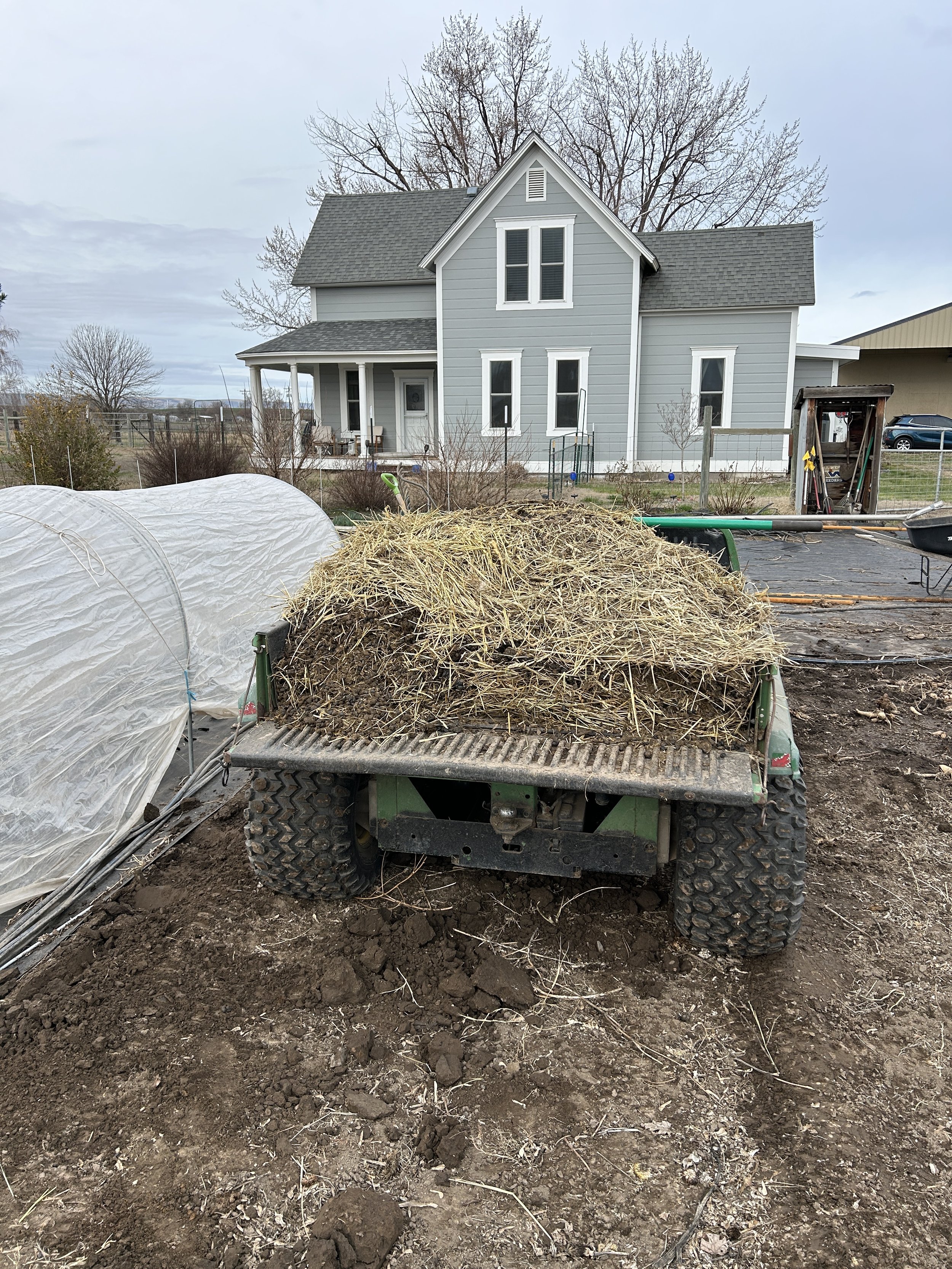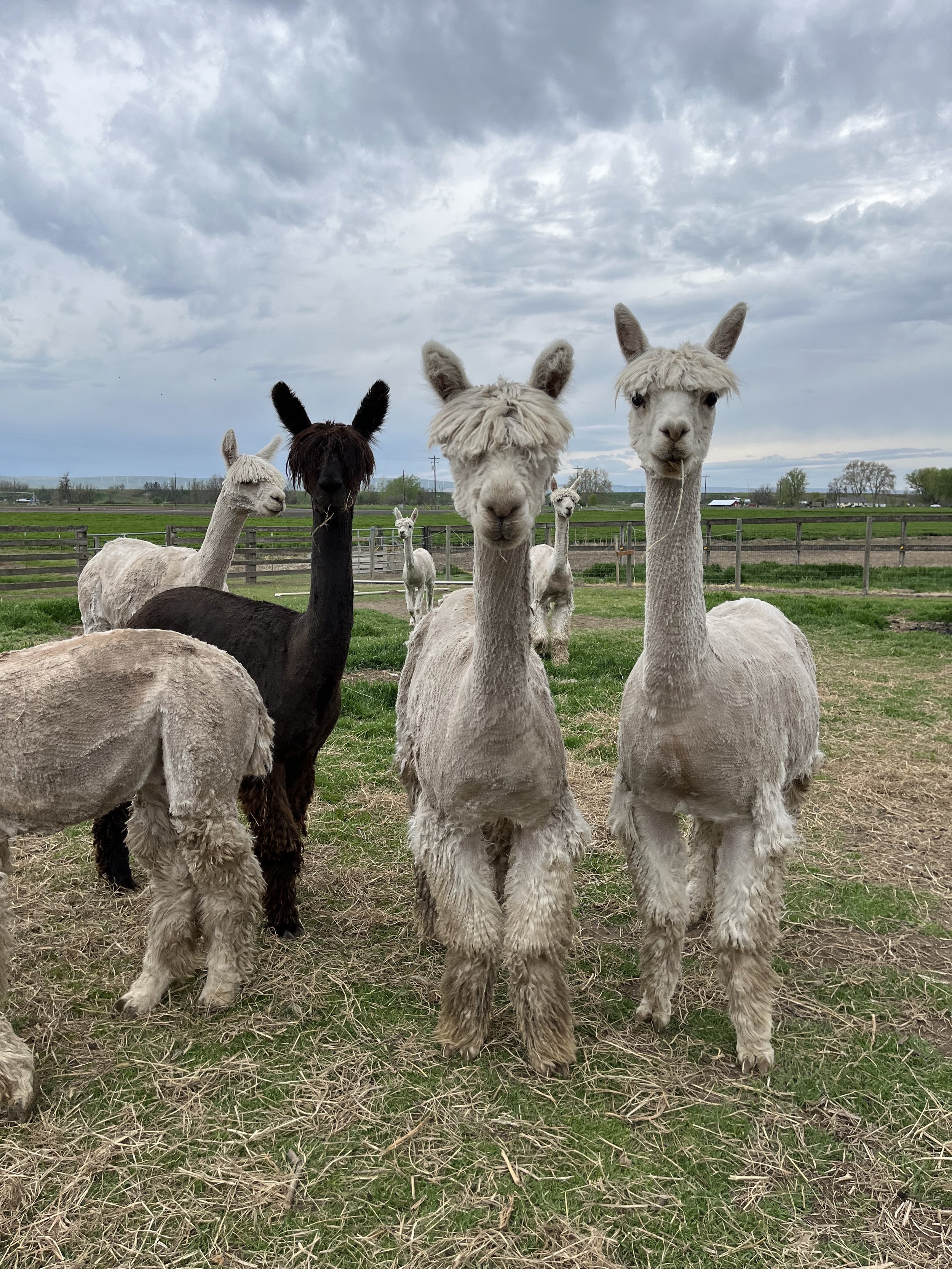Alpacas in the garden
Before the flowers, I was purely an alpaca operation, raising those adorable creatures for their fiber which I turned into yarn for crafters, and a line of machine knit garments. I sell the alpacas goods under the trade name Old Homestead Alpacas.
Becoming a natural fiber producer, I went down an internet rabbit hole to learn all the ways I could use it.
And that’s where I discovered natural dyeing — using plants, roots, flowers and seed to derive natural pigments to color my white and beige fiber.
I’ve grown a small Dye Garden each year.
While starting seeds for the dye garden in 2017, I had the thought - could I also grow and sell — flowers for bouquets?
And I learned quickly the answer was YES!
I’ve been growing and selling cut flowers for the Walla Walla farmer’s market and my subscription delivery service ever since.
It’s a lovely balance that works great on my farm. I have my alpacas annual shearing in May, then turn them out to pasture to grow their next fiber harvest. The alpacas really require little from me May through September. So in those months, I grow a cut flower garden and use the revenues to sustain the farm.
Like most farmers, when I expanded to offer cut flowers, I needed to do it efficiently. Save for some new seeds each year, I really wanted it to be minimal input.
And secret as most farmers and gardeners know - the key to a thriving crop: healthy, nutrient-rich soil.
The best way I’ve achieve that? By using what I’ve had on hand — alpaca manure!
I used it that first season, tilling in only a few wheelbarrow loads because I wasn’t sure how much was supposed to go in. That first season of flowers was amazing - some say beginners luck - but I know it was the poop!
Ever since, I haul their alpaca manure across the farm in huge loads. Here’s why!
A Nutrient-Rich, Gentle Fertilizer
Unlike some livestock manure, alpaca manure is considered “cold,” meaning it doesn’t need to be composted before use. It’s naturally lower in nitrogen than horse or chicken manure, so it won’t burn tender plants, making it perfect for flowers.
Despite its gentle nature, alpaca manure is packed with essential nutrients like nitrogen, phosphorus, and potassium—the key ingredients for healthy plant growth. The approximate N-P-K ratio of alpaca manure is 1.5-0.2-1.1, which provides a balanced and slow-release nutrient supply. These nutrients help promote strong stems, lush foliage, and abundant blooms.
Soil Health and Structure
Our alpaca manure enhances soil structure by improving aeration and moisture retention. Its fibrous texture helps break up heavy clay soils, making it easier for roots to grow, while also adding organic matter that boosts microbial activity. A well-balanced soil ecosystem leads to stronger, more resilient plants. Plants that like to churn out the blooms!
Eco-Friendly
Alpacas are known for their gentle impact on the environment. Their manure is naturally lower in odor than other animal waste, making it a pleasant option for home gardeners.
Because alpacas digest their food efficiently with a specialized three compartment stomach system, their manure is less likely to contain weed seeds, reducing unwanted plant growth in your garden.
Beyond their manure, alpacas help sequester carbon. Their soft, padded feet cause minimal soil disruption, allowing plant roots to remain undisturbed and continue storing carbon. And their efficient grazing habits encourage healthy pasture growth, which naturally absorbs more carbon dioxide from the atmosphere.
Easy to Use
One of the biggest advantages of alpaca manure is how easy it is to use. You can apply it directly to your garden without composting, or mix it into compost for an even richer blend. Sprinkle it around the base of your flowers as a slow-release fertilizer, or brew it into a “manure tea” by soaking it in water and using the nutrient-rich liquid as a foliar feed.
Bloom Boosting
By prioritizing soil health and using my alpacas’ manure, I’ve observed stronger root systems that are better able to absorb water and nutrients, leading to more robust, longer-lasting blooms. The compounding effects of using alpaca manure season after season has led to less overall pest pressure.
I almost always have extra alpaca manure available. I’m planning to bring some to market this season but you can always reach out if you’d like to get some from the farm!






